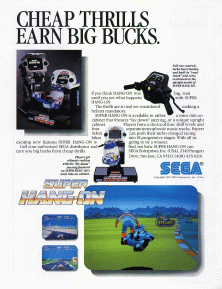Super Hang-On
| Super Hang-On | |
|---|---|

North American trade flyer showing sitdown and standup versions of the arcade cabinet
|
|
| Developer(s) | Sega AM2 |
| Designer(s) | Yu Suzuki |
| Composer(s) | Katsuhiro Hayashi Koichi Namiki |
| Platform(s) | Arcade, Sega Genesis, Game Boy Advance, Commodore Amiga, Atari ST, Macintosh, ZX Spectrum, Amstrad CPC, Commodore 64, Nintendo 3DS |
| Release |
Arcade 1987 Sega Genesis Sharp X68000
|
| Genre(s) | Racing |
| Mode(s) | Single player |
| Cabinet | Upright, sit-down |
| Sound | YM2151 |
| Review scores | |
|---|---|
| Publication | Score |
| CVG | 8/10 |
| Crash | 85% |
| Sinclair User | 10/10 |
| Your Sinclair | 8/10 |
| MegaTech | 89% |
| ACE | 752 |
| Mega | 90% |
| Awards | |
|---|---|
| Publication | Award |
| Sinclair User | SU Classic |
| Your Sinclair | 27th Best Spectrum Game of all time |
Super Hang-On (スーパーハングオン?) is a motorcycle racing arcade game released by Sega, and the sequel to the acclaimed Hang-On. A version of this game, in the full simulated-motorcycle cabinet used by the original Hang-On, was released in 1991 as Limited Edition Hang-On.
The arcade mode in Super Hang-On is similar to the original Hang-On. However, there is a choice of four tracks to race on which are based on continents, each containing a different amount of stages. Also, should the player reach the normal maximum speed of 280 km/h, a turbo button is enabled. Using this button allows the player to reach an even higher top speed of 324 km/h. Each stage is roughly half the length of a stage in the original Hang-On. Africa is the easiest and shortest out of the four courses (six stages). Asia is the second easiest and is similar in length to the course from the original Hang-On at ten stages long. The Americas is the second to toughest course, containing 14 stages and Europe is the hardest course, being 18 stages long. When the player starts a race, they have their choice of four songs that will play during the race, a feature borrowed from Out Run.
The Sega Mega Drive version of the game included the full arcade game, and an additional original mode, which allowed players to recruit sponsors and earn money to buy enhanced components for their bike. The cover for this version has a bike and rider in the same colors as Shinichi Itoh, who competed in the All-Japan 500 cc Championship on a Rothmans Honda NSR500.
The ZX Spectrum version was as accurate to the arcade as possible on that platform, scoring 10/10 in Sinclair User, and was rated number 27 in the Your Sinclair Official Top 100 Games of All Time.
...
Wikipedia
